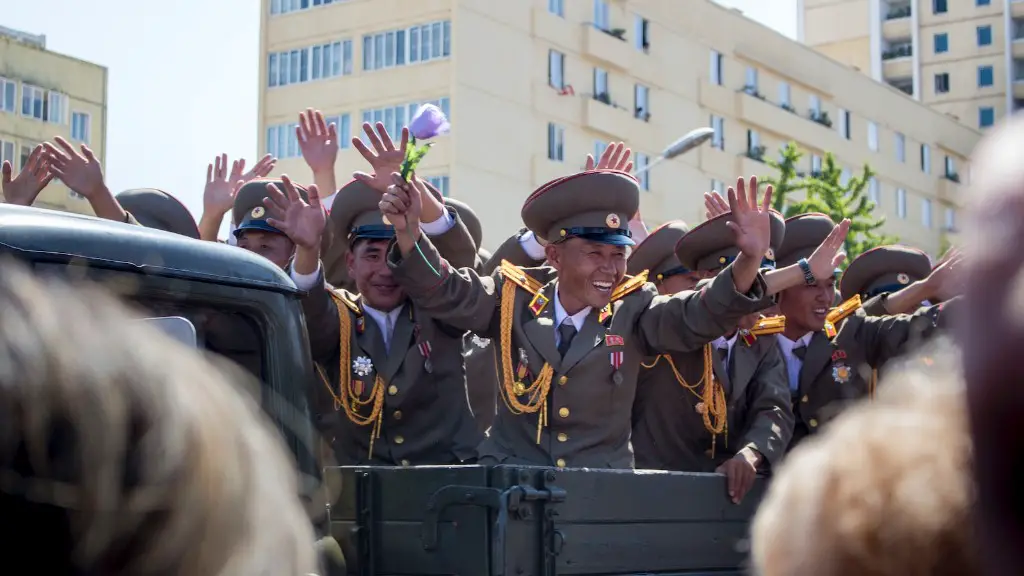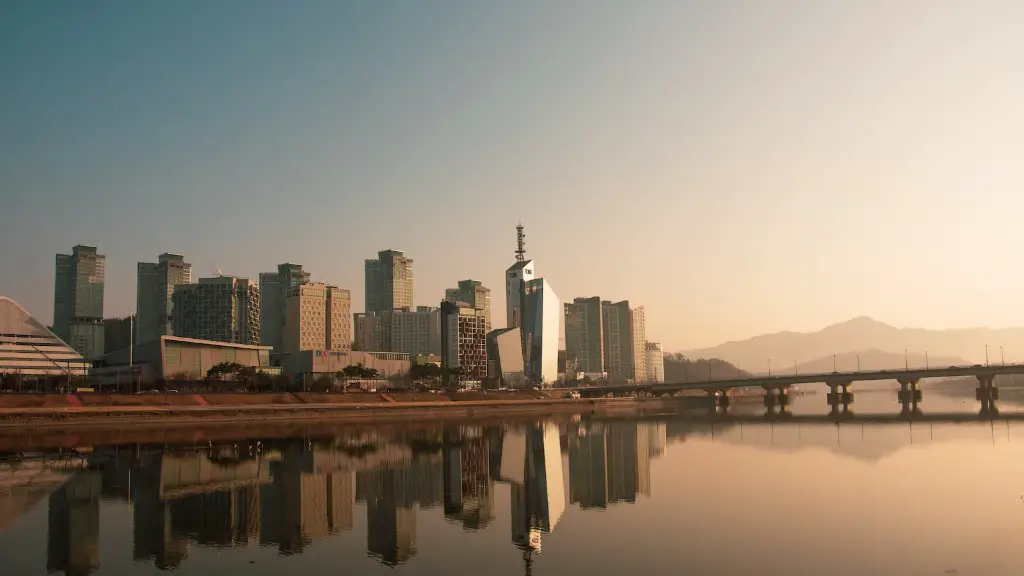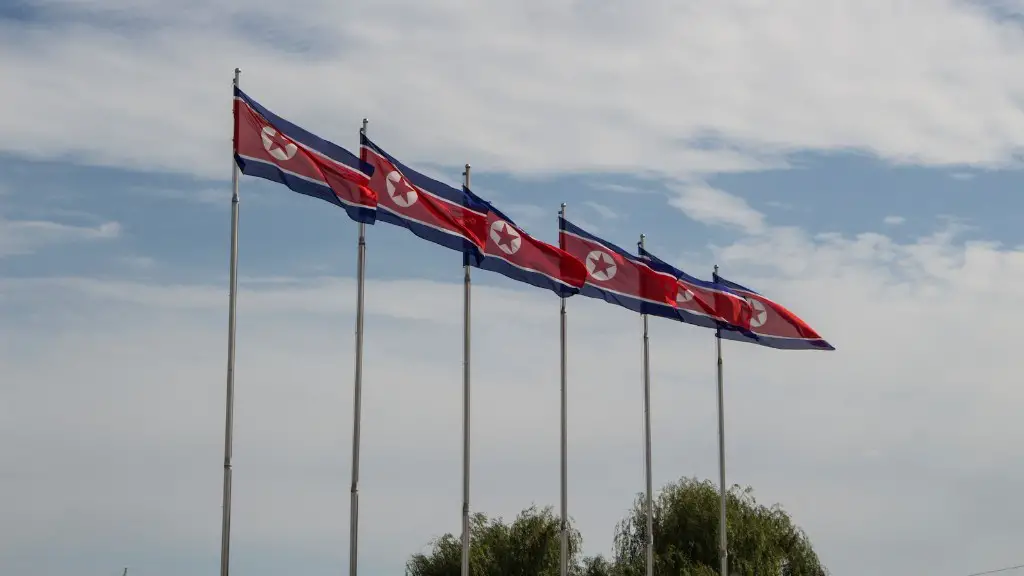Introduction
North Korea has long been a source of fear and fascination simultaneously because of its secretive nature. Though suppressed from the public eye, North Korea still has a powerful military capability, as evidenced by their recent attempts to shoot rockets and test nuclear weapons. Thus, it begs the question: Where does North Korea get its weapons? This article will delve into the sources of North Korea’s military protection, examining its past allies, its potential illicit activities, and the potential for certain technologies with the potential to make the country even more powerful.
Past Allies Provide Limited Assistance
In the past, North Korea’s main weapon supply has come from China and the Soviet Union. China, North Korea’s neighbor, has relied heavily on economic support, while providing military equipment. In the early 2000s, however, China has begun to limit its aid to North Korea in an effort to show its commitment to limiting the development of nuclear weapons. Despite this, China still continues to provide a significant portion of North Korea’s weapons and economic assistance.
The Soviet Union, on the other hand, has supplied North Korea with weapons such as tanks, fighter jets, and missiles since the 1950s, when the two nations formed an alliance. Though the Soviet Union no longer exists, Russia has continued to supply the North Korean military with limited amounts of weaponry and military aid.
Illicit Activities Provide Additional Weaponry
North Korea has also resorted to other methods of attaining military weapons. Reports have surfaced of illicit activities, such as the trafficking of drugs, narcotics, and illegal arms, which generate profits that are allegedly used to fund the military. North Korea is also accused of selling weapon components to countries such as Iran, Pakistan, and Syria, who then assemble the components into usable military hardware. North Korea has even been suspected of selling weapons to terrorist organizations sympathetic to the country.
Potential for Advanced Technology
North Korea is believed to possess advanced, cutting edge technologies that could enhance their current capabilities. Reports indicate that they have been working on creating a super-cruise missile that has the potential to reach Indonesia, Japan, and other surrounding countries. North Korean scientists are also believed to be working on an electromagnetic pulse (EMP) weapon which could be released from an aircraft or satellite, and have a crippling effect on electronics, infrastructure, and other civilian and military applications.
Political Relationships Provide Opportunity for Support
North Korea is known for its international political relationships, including their reciprocal relationship with China. When China was under threat of a US-led missile defense system, North Korea provided strong opposition, resulting in increased economic ties, military cooperation, and arms sales between the two countries. Additionally, North Korea’s relationship with Iran has resulted in increased military exchanges and economic assistance.
Role of the United Nations
The United Nations works diligently to deter North Korea’s access to weapons, though their efforts prove difficult given North Korea’s record of flaunting UN resolutions and sanctions. Despite these efforts, North Korea has continued to further advance its military capabilities, with their recent test of a submarine-launched ballistic missile being a prime example.
Economic Impacts of Sanctions
Due to North Korea’s illicit activities, UN sanctions have been imposed to prevent the proliferation of their military capabilities. These sanctions not only target critical sectors of North Korea’s economy, such as banking and exports, but also aim to limit the trade of weapons and other military-related resources. The sanctions are used as a form of economic pressure, and have been credited as the reason for North Korea’s short-term economic decline.
The Effect of Sanctions on North Korea’s Weapons Supply
The effectiveness of the UN sanctions can only be judged on their overall impact on the North Korean weapons supply. It is difficult to determine whether the sanctions are actually restricting access to weapons since there are no independent agencies or sources of information to validate these claims. Still, the sanctions seem to be having some kind of a chilling effect, as evidenced by the decline in North Korea’s nuclear testing and missile launches.
U.S. Presence in the Region
North Korea has long been at odds with the United States, and the U.S. presence in the region continues to influence its access to weapons. The U.S. has positioned forces in South Korea, and will often hold military exercises there as a form of deterrence. The U.S. also has strong political ties to Japan, and has provided the country with extensive military support. This has led to Japan’s possession of some of the most advanced weapons systems in the world, making North Korea’s access to these systems much more limited.
The Role of Inter-Korean Relations
The two Koreas continue to remain in a slightly hostile state, with the South’s military possession vastly outnumbering that of the North. The South has taken measures to deter threats from the North, such as deploying anti-ship missiles and advanced radar systems in their territorial waters. The South’s military capability has been credited as the main reason for the North’s attempts to acquire nuclear weapons, as it provides the North with a feeling of security and a way to deter future conflict.
International Reaction to North Korea’s Weapons Supply
The international community’s response to North Korea’s access to weapons varies by country. Many of North Korea’s neighbors have strong military forces, such as Japan and South Korea, in case it becomes necessary to counter the North’s actions. The United Nations has imposed sanctions, as previously mentioned, and continues to employ other diplomatic means to prevent North Korea from further developing its military capabilities. The United States has also, from time to time, done its part to provide aid or military support to North Korea’s neighbors as a way to deter the North from acquiring new weapons.
Northern China’s Responsibilities
Northern China has provided the most approval, support, and assistance to North Korea out of any other country. This means that this region of the world should shoulder some responsibility when it comes to helping prevent the North Korean weapons supply by using economic, diplomatic, and military means. Northern China has not been active in this regard and, as such, its reluctance to become involved has opened the door for North Korea to increase its weapons supply, even with the sanctions in place.
Insights and Analysis
North Korea has continued to amass a significant amount of military weaponry, despite international sanctions and disapproval. It is clear that North Korea’s weapons supply comes from a variety of sources, from its past allies, to illicit activities, and its own cutting-edge technology. North Korea’s neighbors, too, have had to take precautionary measures to ensure their safety following increased military capabilities and threats from their northern neighbor. Ultimately, it is clear that the international community must come together and take a more active role in preventing the North Korean weapons supply in order to safeguard global security.



